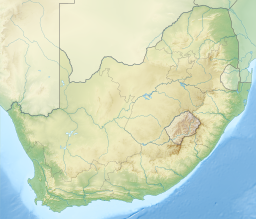Lake St Lucia (Lake Saint Lucia) is an estuarine lake system in northern KwaZulu-Natal, South Africa. It is the largest estuarine lake in Southern Africa, covering an area of approximately 350 square kilometres (140 sq mi), and falls within the iSimangaliso Wetland Park (a World Heritage Site).
| Lake St. Lucia | |
|---|---|
| Lake Saint Lucia | |
 False Bay, Lake St Lucia | |
| Location | South Africa |
| Coordinates | 27°59′S 32°27′E / 27.983°S 32.450°E |
| Type | estuarine lake |
The lake was named Santa Lucia by Manuel Perestrello on 13 December 1575, the day of the feast of Saint Lucy.[1] It was later renamed to St. Lucia.

Flora and fauna
editMore than 2,180 species of flowering plants have been documented in the St Lucia lake system.[2]
St Lucia Lake harbours rich fauna, including crocodiles, hippopotami, monitor lizards, over 400 bird species, invertebrates, and the occasional bull shark.[3][4]
References
edit- ^ Santa Lucia: http://www.santalucia.co.za/history.php Archived 2015-09-10 at the Wayback Machine, retrieved 8 August 2015
- ^ Thieme, Michele; Abell, Robin; Burgess, Neil; Lehner, Bernhard; Dinerstein, Eric; Olsen, David (2005). Freshwater Ecoregions of Africa and Madagascar: A Conservation Assessment. Island Press. p. 331.
- ^ Nel, H.A., Perissinotto, R. & Taylor, R.H. 2012. Diversity of bivalve molluscs in the St Lucia Estuary, with an annotated and illustrated checklist. African Invertebrates 53 (2): 503-525."Bivalvia from St Lucia Estuary". Archived from the original on 24 December 2012. Retrieved 14 November 2012.
- ^ Perissinotto, R., Taylor, R.H., Carrasco, N.K. & Fox, C. 2013. Observations on the bloom-forming jellyfish Crambionella stuhlmanni (Chun, 1896) in the St Lucia Estuary, South Africa. African Invertebrates 54 (1): 161–170."Observations on the bloom-forming jellyfish Crambionella stuhlmanni (Chun, 1896) in the St Lucia Estuary, South Africa | Perissinotto | African Invertebrates". Archived from the original on 25 July 2013. Retrieved 25 July 2013.
